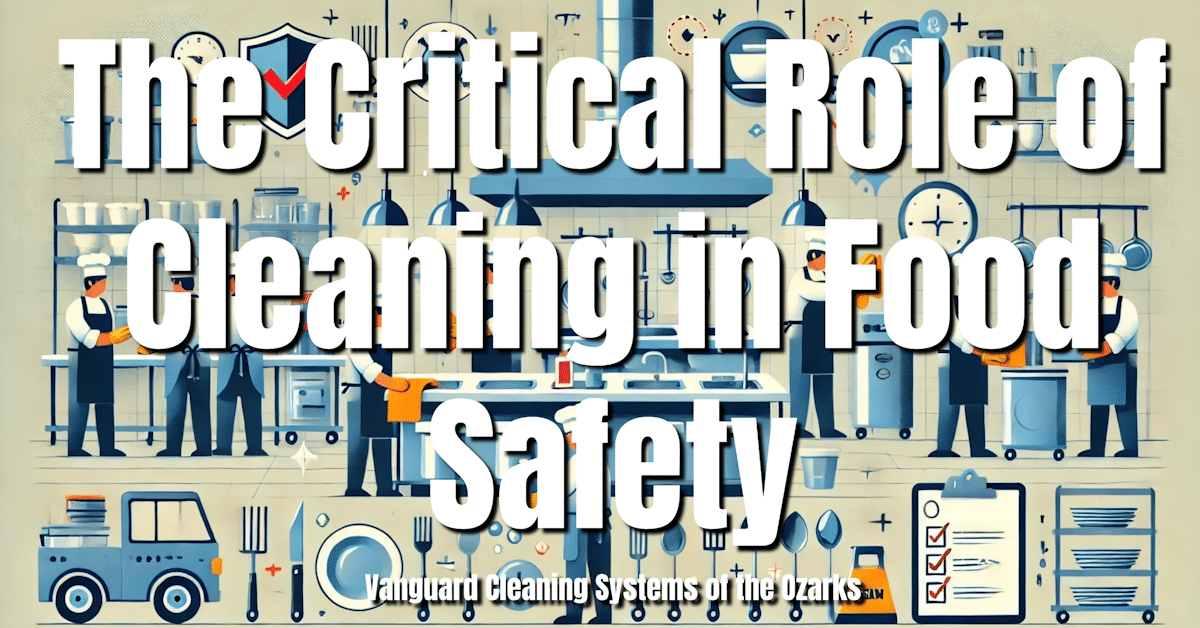Effective cleaning is the foundation of food safety, protecting public health, and ensuring the quality of every product that leaves your facility.

The Vital Role of Cleaning in Food Safety Management
Cleaning is a cornerstone of food safety, essential for preventing contamination and upholding hygiene in the food production process.
Properly cleaned surfaces and equipment are vital for minimizing the risk of microbial contamination and avoiding cross-contamination with allergens and pathogens.
As hygiene standards rise due to stricter regulations and heightened consumer expectations, effective cleaning practices become increasingly crucial for protecting public health and ensuring the safety and quality of food products.
Reduction of Microbial Contamination
Essential Insight: Effective cleaning and disinfection are vital for reducing microbial contamination in food processing environments.
What You Can Do: Develop a thorough sanitation program aimed at removing food residues, microorganisms, and other contaminants from all surfaces.
How to Apply:
- Schedule regular cleaning sessions for both equipment and surfaces.
- Choose disinfectants and cleaning agents that are specifically formulated for food processing.
- Make sure your staff is well-trained in proper cleaning techniques and the correct use of cleaning products.
Why It Matters: Lowering microbial contamination significantly enhances food safety, ensuring that the products reaching consumers are both safe and of the highest quality. This proactive strategy is essential for safeguarding public health and maintaining the dependability of your production process.
Prevention of Cross-Contamination
Essential Insight: Proper cleaning practices are crucial for preventing cross-contamination, particularly with allergens and pathogens.
What You Can Do: Regularly inspect and maintain your cleaning equipment to avoid transferring contaminants from surfaces to food products.
How to Apply:
- Conduct routine checks on cleaning tools to confirm they are functioning correctly.
- Use separate equipment for different tasks to prevent cross-contamination between allergenic and non-allergenic food items.
- Educate your staff on the critical importance of preventing cross-contact during the cleaning process.
Why It Matters: Preventing cross-contamination is vital for meeting food safety standards and safeguarding consumers from potential health risks. By adhering to strict cleaning protocols, you can protect the integrity and safety of your food products, which is essential in today’s highly regulated industry.
Importance of Surface Hygiene
Essential Insight: Keeping food-contact surfaces clean is essential to preventing foodborne illnesses.
What You Can Do: Move beyond visual inspections by using dependable testing methods, such as ATP bioluminescence, to confirm surface cleanliness.
How to Apply:
- Incorporate ATP testing into your routine cleaning verification process.
- Train your staff on the correct use of ATP testing tools and how to interpret the results accurately.
- Establish protocols for re-cleaning any surfaces if ATP tests reveal insufficient cleanliness.
Why It Matters: Relying only on visual inspections can overlook hidden contaminants. By adopting advanced testing methods, you can be confident that your cleaning practices are effective, greatly reducing the risk of foodborne illnesses and ensuring the highest hygiene standards in your food production process.
Cost-Effectiveness and Compliance
Essential Insight: A well-managed sanitation program is both cost-effective and sustainable, ensuring ongoing compliance with hygiene standards.
What You Can Do: Develop a sanitation plan that balances hygiene with cost efficiency while fully meeting all regulatory requirements.
How to Apply:
- Perform a cost-benefit analysis of your current sanitation practices to pinpoint areas for improvement.
- Invest in training that focuses on efficient cleaning methods to minimize waste and boost effectiveness.
- Regularly review and update your sanitation protocols to stay in line with the latest industry standards and regulations.
Why It Matters: A cost-effective sanitation program not only meets regulatory requirements but also improves operational efficiency, making it easier to maintain hygiene standards over the long term. This approach helps you stay compliant with changing legislation while ensuring the delivery of safe, high-quality food products that meet consumer expectations.
References
- Holah, J. T. (1992). Industrial Monitoring: Hygiene in Food Processing. Biofilms — Science and Technology, 645–659. https://doi.org/10.1007/978-94-011-1824-8_57
- Cleaning and disinfection practices in food processing. (2014). Hygiene in Food Processing, 259–304. https://doi.org/10.1533/9780857098634.3.259
- CUNNINGHAM, A. E., RAJAGOPAL, R., LAUER, J., & ALLWOOD, P. (2011). Assessment of Hygienic Quality of Surfaces in Retail Food Service Establishments Based on Microbial Counts and Real-Time Detection of ATP. Journal of Food Protection, 74(4), 686–690. https://doi.org/10.4315/0362-028x.jfp-10-395
- HOLAH, J. T. (1995). Disinfection of food production areas. Revue Scientifique et Technique de L’OIE, 14(2), 343–363. https://doi.org/10.20506/rst.14.2.850
Takeaway
Cleaning is a crucial aspect of food safety management, vital for preventing contamination and upholding stringent hygiene standards throughout the food production process.
By adopting effective cleaning practices, you can significantly minimize microbial contamination, prevent cross-contamination, and ensure that all surfaces achieve the highest levels of cleanliness.
Moreover, a well-managed sanitation program not only meets regulatory requirements but is also cost-effective and easier to sustain.
Prioritizing cleaning within your food safety strategy is essential for safeguarding public health, ensuring product quality, and satisfying consumer expectations.
Vanguard Cleaning Systems® of the Ozarks' franchise-owned custodial service provider business cleans more than 8M sq. ft. weekly, maintaining an industry topping 95+% of its customer base, year-over-year, and boasting more than 60 5-star Google reviews.
Need more capability from your vendor partners? --Let's talk.
In Oklahoma, dial 918-960-4450
In Arkansas, dial 479-717-2410
In Missouri, dial 417-812-9777
